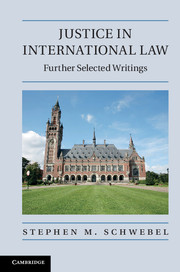Book contents
- Frontmatter
- Contents
- PART I International Court of Justice
- PART II International arbitration
- 12 A BIT about ICSID
- 13 The influence of bilateral investment treaties on customary international law
- 14 The United States 2004 Model Bilateral Investment Treaty: an exercise in the regressive development of international law
- 15 The United States 2004 Model Bilateral Investment Treaty and denial of justice in international law
- 16 Anti-suit injunctions in international arbitration: an overview
- 17 The law applicable in international arbitration: application of public international law
- 18 The validity of an arbitral award rendered by a truncated tribunal
- 19 The authority of a truncated tribunal
- 20 Injunction of arbitral proceedings and truncation of the tribunal
- 21 Public policy and arbitral procedure
- 22 The creation and operation of an International Court of Arbitral Awards
- 23 The Kingdom of Saudi Arabia and Aramco arbitrate the Onassis Agreement
- 24 The Southern Bluefin Tuna case
- 25 A celebration of the United Nations New York Convention on the Recognition and Enforcement of Foreign Arbitral Awards
- 26 Does the consent of the Contracting Parties govern the requirement of an “investment” as specified in Article 25 of the ICSID Convention?
- PART III Miscellaneous
- Collected publications, judicial opinions and book reviews
- Index
19 - The authority of a truncated tribunal
from PART II - International arbitration
Published online by Cambridge University Press: 07 September 2011
- Frontmatter
- Contents
- PART I International Court of Justice
- PART II International arbitration
- 12 A BIT about ICSID
- 13 The influence of bilateral investment treaties on customary international law
- 14 The United States 2004 Model Bilateral Investment Treaty: an exercise in the regressive development of international law
- 15 The United States 2004 Model Bilateral Investment Treaty and denial of justice in international law
- 16 Anti-suit injunctions in international arbitration: an overview
- 17 The law applicable in international arbitration: application of public international law
- 18 The validity of an arbitral award rendered by a truncated tribunal
- 19 The authority of a truncated tribunal
- 20 Injunction of arbitral proceedings and truncation of the tribunal
- 21 Public policy and arbitral procedure
- 22 The creation and operation of an International Court of Arbitral Awards
- 23 The Kingdom of Saudi Arabia and Aramco arbitrate the Onassis Agreement
- 24 The Southern Bluefin Tuna case
- 25 A celebration of the United Nations New York Convention on the Recognition and Enforcement of Foreign Arbitral Awards
- 26 Does the consent of the Contracting Parties govern the requirement of an “investment” as specified in Article 25 of the ICSID Convention?
- PART III Miscellaneous
- Collected publications, judicial opinions and book reviews
- Index
Summary
Does a truncated arbitral tribunal have the authority to act and to render a valid award? …
A decade ago, I surveyed the problem as it had developed over the last two centuries; and as it had recently intensified in the proceedings of the Iran–United States Claims Tribunal. I concluded that:
Withdrawal of an arbitrator from an international arbitral tribunal which is not authorized or approved by the tribunal is a wrong under customary international law and the general principles of law recognized and applied in the practice of international arbitration. It will generally constitute a violation of the treaty or contract constituting the tribunal, if not in terms then because the intention of the parties cannot be deemed to have authorized such withdrawal.
Such a wrongful withdrawal may not, as a matter of international legal principle, debar an international arbitral tribunal from proceeding and rendering a valid award.
While the precedents are not uniform, and the commentators are divided, the weight of international authority, to which the International Court of Justice has given its support, clearly favours the authority of an international arbitral tribunal from which an arbitrator has withdrawn to proceed and to render a valid award.
In the last ten years, the question has received more than one answer. The Iran–United States Claims Tribunal has continued to hold that a truncated tribunal may render a valid award. However, in the case of Ivan Milutinovic PIM v. Deutsche Babcock AG, the holdings conflict.
- Type
- Chapter
- Information
- Justice in International LawFurther Selected Writings, pp. 206 - 211Publisher: Cambridge University PressPrint publication year: 2011



